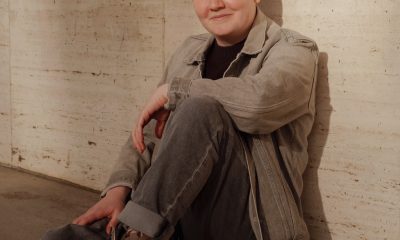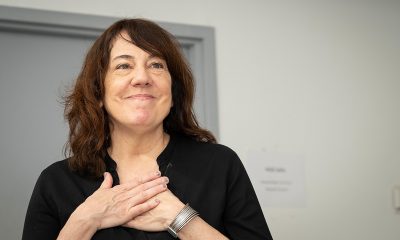Theater
Studio’s ‘Tear You Apart’ play explores ‘fat girl/gay man trope’
BFF dynamic threatened when new girl enters the picture
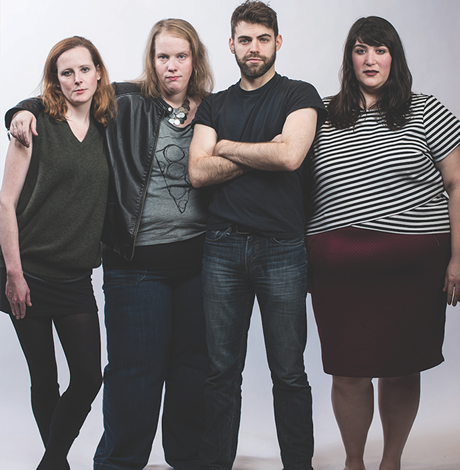
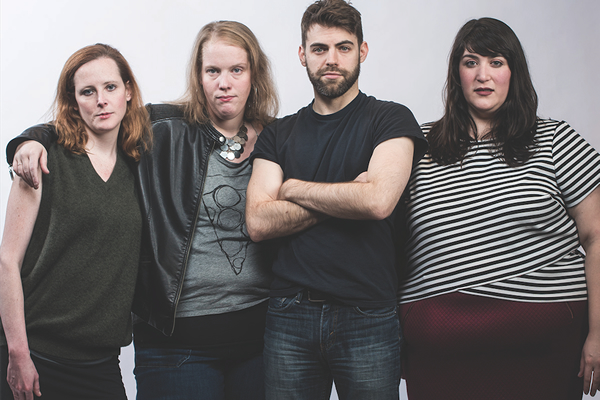
From left are Anna O’Donoghue, Morgan Gould, Tommy Helenringer and Nicole Spiezio, the creative team behind ‘I Wanna Fucking Tear You Apart.’ (Photo by Teddy Wolff; courtesy Studio Theatre)
‘I Wanna Fucking Tear You Apart’
Through Feb. 19
1501 14th St., N.W.
Tickets start at $20
202-332-3300
As both titular and practical leader of Morgan Gould & Friends, a New York-based theater company, Morgan Gould writes and directs pop culture satires. Its 13 members — Gould’s friends — are mostly longtime collaborators she met at Fordham University where she majored in directing.
“It’s really not hard to get in the company,” she says. “All you have to do is ask, really.”
With her new play “I Wanna Fucking Tear You Apart,” a funny and dark play about friendship and the politics of niceness and beauty, Gould steps away from her satiric comfort zone.
“It’s a straightforward and hopefully well-made play,” says Gould who’s also directing the dramedy. For the play’s D.C. premier at Studio Theatre, she brings along company members out actor Tommy Heleringer and Anna O’Donoghue who play Leo and Chloe, and a new friend, Nicole Spiezio, who leads the cast as Samantha.
Loquacious, energetic and refreshingly brash, Gould is delighted that her work is in production at legitimate regional theater. So much so, she was even willing to change the play’s provocative title (proudly lifted from the song “Tear You Apart” by She Wants Revenge that Gould first heard sung by Lady Gaga on TV’s “American Horror Story”) if Studio’s hierarchy thought it was too much. They didn’t.
Last week at Studio’s second-floor lobby, Gould, Heleringer and Spiezio (all 30-ish) sat down before rehearsal to chat with the Blade.
GOULD: There is a famous Morgan Gould. It’s not me. He’s a hot, black South African soccer star. But I got on Twitter before him so my Twitter handle is @morgangould so I get tweeted all the time. Stuff like, “Sorry about your injury.” And I reply, “It’s OK man.” Sometimes it gets contentious. Little do they know they’ve tweeted some fat playwright who looks like actress Lori Beth Denberg.
WASHINGTON BLADE: So what’s this violently titled play about?
NICOLE SPIEZIO: Tommy and I play best friends Leo and Samantha. He’s a gay man and I’m a fat woman but we’re more than that. We’re also writers and roommates. So we spend a lot of time together.
GOULD: Co-dependent has been bandied about, which I’m not so crazy about because it’s in part based on me and my gay friend.
SPIEZIO: It’s about that critical juncture in your life when college ends but you don’t want it to end because the friends you made at college have become your family so you keep it going. Over that year after college, Leo and Samantha are figuring out what’s next for them. My character has a boyfriend and her career is taking off. Leo is still trying to find his path.
BLADE: Have you been in a relationship like this in real life?
TOMMY HELERINGER: Of course. It’s scarily relatable. During rehearsal I’ve been pulling things from what I’ve had with them.
SPIEZIO: Yes, all fat girls have gay male friends. The fat girl/gay man trope is alive and well.
GOULD: Unless you’re fat and dumb. But if you’re fat and slightly smart, you will have gay male friends. The fat woman/gay male friendship is an intoxicating relationship. When I was writing the play I thought about the most important relationships of my life and those are with my best gay guy friends. We know what hate looks like. When I walk in a room, I know immediately which person hates fat people. They don’t have to say a word. You learn that early. And gay men learn who hates them really early too. We find each other like a safe haven, a place where we can be mean and funny together. It’s us against the world. But as you age, you can shed that because you don’t need that protection. This doesn’t mean that these friendships end necessarily. They just change. Our characters are arriving at that place. Growth is good but it’s painful. I hate terms like fruit fly or fag hag. Smart fat women love gay men. We’re both traumatized. It’s complicated. It’s not like shopping and watching “Project Runway” all the time, though that’s part of it.
BLADE: Back to the play. What else happens?
SPIEZIO: So another woman intrudes on Leo and Samantha’s close friendship. Chloe is Leo’s co-worker and they’re becoming friends outside of work. She’s a threat on several levels: she’s thin, a little younger and she doesn’t read as special. She’s basic. Samantha can’t understand how her friend Leo who has the best taste in the world could like this not-terribly smart of funny woman. Samantha can’t fathom why he’d bring her into our space. Her instinct is to say no rather than yes. As a fat woman, she feels people see her as one thing and if it’s negative, it’s their worst nightmare. Any young, thin, flighty girl really needs to prove herself. Samantha is a really great part for a fat woman. There aren’t a lot.
GOULD: This play is from our lives. It turns out one of my first gay best friend from high school was one of Nicole’s gay best friends in college.
BLADE: Tommy, do you and Nicole hang out like best friends offstage? Is life imitating art?
HELERINGER: We tried but it didn’t really work. But seriously, I’m not nuts about that stuff. We didn’t say, “Let’s go home and do improv,” or anything. But yes, we are friends outside of rehearsal and are spending time together. We’re the only people we really know in the city.
BLADE: Tommy is gay. What about you women?
GOULD: I feel fatness queerizes you. But yes, we like men.
BLADE: And why should LGBT theatergoers come?
GOULD: This play is a gift. It’s so gay and fat. Starts as a comedy and evolves as conflicts arise. There’s a drag number and a dance number. If I could take out a billboard it would read, “This is a play for you. Not a pretend play for you, but a real play.”
Theater
‘Amm(i)gone’ explores family, queerness, and faith
A ‘fully autobiographical’ work from out artist Adil Mansoor

‘Amm(i)gone’
Thorough May 12
Woolly Mammoth Theatre
641 D St., N.W.
$60-$70
Woollymammoth.net
“Fully and utterly autobiographical.” That’s how Adil Mansoor describes “Amm(i)gone,” his one-man work currently playing at Woolly Mammoth Theatre.
Both created and performed by out artist Mansoor, it’s his story about inviting his Pakistani mother to translate Sophocles’s Greek tragedy “Antigone” into Urdu. Throughout the journey, there’s an exploration of family, queerness, and faith,as well as references to teachings from the Quran, and audio conversations with his Muslim mother.
Mansoor, 38, grew up in the suburbs of Chicago and is now based in Pittsburgh where he’s a busy theater maker. He’s also the founding member of Pittsburgh’s Hatch Arts Collective and the former artistic director of Dreams of Hope, an LGBTQ youth arts organization.
WASHINGTON BLADE: What spurred you to create “Amm(i)gone”?
ADIL MANSOOR: I was reading a translation of “Antigone” a few years back and found myself emotionally overwhelmed. A Theban princess buries her brother knowing it will cost her, her own life. It’s about a person for whom all aspirations are in the afterlife. And what does that do to the living when all of your hopes and dreams have to be reserved for the afterlife?
I found grant funding to pay my mom to do the translation. I wanted to engage in learning. I wanted to share theater but especially this ancient tragedy. My mother appreciated the characters were struggling between loving one another and their beliefs.
BLADE: Are you more director than actor?
MANSOOR: I’m primarily a director with an MFA in directing from Carnegie Mellon. I wrote, directed, and performed in this show, and had been working on it for four years. I’ve done different versions including Zoom. Woolly’s is a new production with the same team who’ve been involved since the beginning.
I love solo performance. I’ve produced and now teach solo performance and believe in its power. And I definitely lean toward “performance” and I haven’t “acted” since I was in college. I feel good on stage. I was a tour guide and do a lot of public speaking. I enjoy the attention.
BLADE: Describe your mom.
MANSOOR: My mom is a wonderfully devout Muslim, single mother, social worker who discovered my queerness on Google. And she prays for me.
She and I are similar, the way we look at things, the way we laugh. But different too. And those are among the questions I ask in this show. Our relationship is both beautiful and complicated.
BLADE: So, you weren’t exactly hiding your sexuality?
MANSOOR: In my mid-20s, I took time to talk with friends about our being queer with relation to our careers. My sexuality is essential to the work. As the artistic director at Dreams of Hope, part of the work was to model what it means to be public. If I’m in a room with queer and trans teenagers, part of what I’m doing is modeling queer adulthood. The way they see me in the world is part of what I’m putting out there. And I want that to be expansive and full.
So much of my work involves fundraising and being a face in schools. Being out is about making safe space for queer young folks.
BLADE: Have you encountered much Islamophobia?
MANSOOR: When 9/11 happened, I was a sophomore in high school, so yes. I faced a lot then and now. I’ve been egged on the street in the last four months. I see it in the classroom. It shows up in all sorts of ways.
BLADE: What prompted you to lead your creative life in Pittsburgh?
MANSOOR: I’ve been here for 14 years. I breathe with ease in Pittsburgh. The hills and the valleys and the rust of the city do something to me. It’s beautiful, it’ affordable, and there is support for local artists. There’s a lot of opportunity.
Still, the plan was to move to New York in September of 2020 but that was cancelled. Then the pandemic showed me that I could live in Pittsburgh and still have a nationally viable career.
BLADE: What are you trying to achieve with “Amm(i)gone”?
MANSOOR: What I’m sharing in the show is so very specific but I hear people from other backgrounds say I totally see my mom in that. My partner is Catholic and we share so much in relation to this.
I hope the work is embracing the fullness of queerness and how means so many things. And I hope the show makes audiences want to call their parents or squeeze their partners.
Theater
Jessica Phillips shines in ‘Penelope,’ a ‘pandemic parable’
Alex Bechtel was inspired to write about loneliness, waiting, separation

‘Penelope’
Thorough April 28
Signature Theatre, the Ark
4200 Campbell Ave, Arlington
$40-$99
Sigtheatre.org
In the new musical “Penelope,” Broadway’s Jessica Phillips gives an unforgettable take on the title role torn from the pages of Homer’s “Odyssey” — more or less. Fortified by bourbon and backed by a Greek chorus of musicians, the character uncharacteristically steps out from the background to share her story surrounding two decades waiting on the island kingdom of Ithica for the return of her absent husband Odysseus.
Sometimes described as a “pandemic parable,” the 70-minute work is based on composer/playwright Alex Bechtel’s personal experience. While separated from his partner during COVID, he was inspired to write about loneliness, waiting, and separation, a subject Phillips was eager to tackle.
An accomplished Broadway actor and mother of two, Phillips, 52, is best known for memorable turns in “Dear Evan Hansen,” “The Scarlet Pimpernel,” “Next to Normal,” and “Priscilla Queen of the Desert.”
Two years ago, she made news for coming out as queer after having long been identified as straight. Parts of the theater scene were caught a bit off guard, but only momentarily. Now, she lives in New York with her partner Chelsea Nachman, a theatrical publicist.“We share the same professional community but in very different roles. I think that makes life easier for us.”
Currently enjoying an extended run at Signature in Arlington where the trees are in bloom, she spares time for a phone interview, starting off with“Perfect timing. I’ve just finished the last song on Beyonce’s ‘Cowboy Carter.’ Let’s talk.”
WASHINGTON BLADE: Increasingly, I hear artists report having been deeply changed by the pandemic. Did that have anything to do with your coming out in 2022?
PHILLIPS: Definitely. During the pandemic, those of us in the arts were in deep crisis, because our industry had collapsed in almost every way. At the same time, that space allowed us to be contemplative about where we were. For me, that period of time gave me the space to both come to terms with and confront those fears about saying who I was, out loud and publicly.
BLADE: Did you have professional concerns?
PHILLIPS: Oh yeah, I was specifically worried about perception. Not so much about being queer but more what it meant to have come out relatively late in life. I had some fear around whether people would take me less seriously.
At the same time, I was nervous about being fully transparent and worried about my privacy and being vulnerable. Like other women I knew, I was more comfortable dealing with traditional societal expectations in America. I grew up with those cultural expectations and thought of myself in those terms for a long time.
BLADE: What changed?
PHILLIPS: What’s been so freeing for me, I can confront how I took on those expectations and say I’m not going to let those determine how I live my life. I get to decide.
BLADE: There’s a lot of wonderful storytelling in “Penelope.” What’s been your way into that?
PHILLIPS: My way of moving through the show is allowing this character to experience all five stages of grief. Humor, slapstick comedy, bargaining, denial. And ultimately acceptance and deep grief.
When an audience is alive and invested, it’s palpable and elevates the storytelling. When an audience is having a thinking rather feeling experience that changes the tone of my storytelling and not in a bad way.
It’s interesting how much they’re a part of everything. It’s really intimate. The audience is just six feet away. It’s a unique experience and we’re on this ride together. And I find this to be a really beautiful and satisfying experience that I’ve not had before.
BLADE: After Signature, what’s next for “Penelope”?
PHILLIPS: That’s the million-dollar question. Hopefully we’ll take it forward to New York or tour it, but that requires willingness and money. I do think there’s a broad audience for this. It’s beautiful, unique, artistic, really emotional, and at the same time possesses an intellectual quality that’s missing from a lot of commercial theater these days.
BLADE: And what’s next for theater?
Phillips: I think one good thing that came out of the pandemic is that people like Alex Bechtel had an opportunity to create. In the next decade we’re going to see the results of that. I think we have some extraordinary things to look forward to. If a work like “Penelope” is any indication, we’re all in for something really good.
Theater
‘Nancy,’ soaked in ‘80s nostalgia, is ‘queer AF’
Mosaic production led by out director Ken-Matt Martin
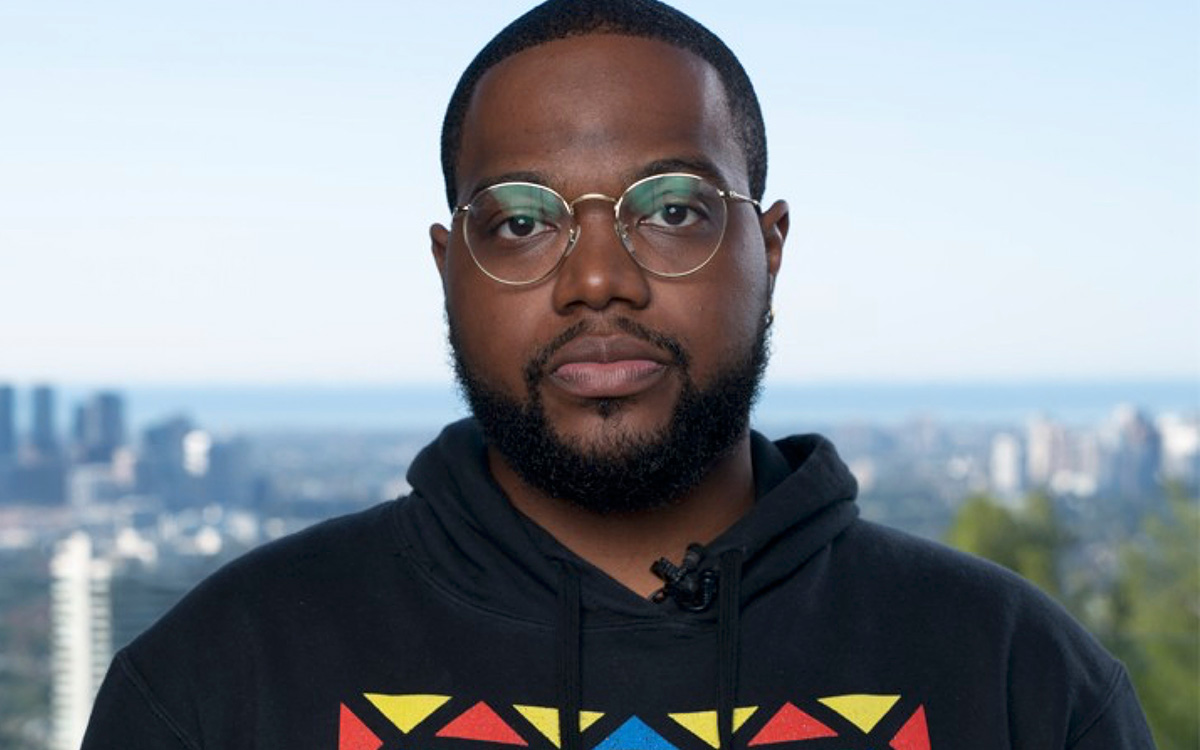
‘Nancy’
Through April 21
Mosaic Theater Company at Atlas Performing Arts Center
1333 H St., N.E.
$53-$70
Mosaictheater.org
Set in 1985, smack dab in the middle of the Reagan years, Rhiana Yazzie’s “Nancy” is totally soaked in nostalgia: shoulder pads, high hair, Van Halen, etc. For some theatergoers, it jogs the memory and for others serves as an introduction to an alien era.
Out director Ken-Matt Martin describes the production (now at Mosaic Theater) as “queer AF.” He continues, “But that’s true with everything I touch. My aesthetics and interests are unapologetically queer. When you first walk into theater, you see a big ass picture of Nancy’s face. The whole play is kind of set on her face.”
Martin, who puts his age as “somewhere over 30,” gives a brief rundown via telephone: “‘Nancy’ places two women on parallel tracks and we get to watch them on a collision course. Esmeralda [Anaseini Katoa], a Navajo mother and advocate determined to improve the condition of her family and reservation. Her story is juxtaposed to that of Nancy Reagan [Lynn Hawley] who’s busy at the White House consulting with society astrologer Joan Quigley to help guide Reagan [Michael Kevin Darnall] and his administration. The women’s worlds come together over Nancy’s direct ancestral connection to Pocahontas.”
The busy storyline also includes a moment surrounding Rock Hudson’s final days, a moment when well-coiffed, clothes-crazy Nancy was presented with the opportunity to make a difference but chose not to.
“And the work doesn’t let Nancy off the hook,” adds Martin. “It’s a full meal of a play.”
Produced in partnership with New Native Theatre based in the Twin Cities, Mosaic’s epic offering, a very D.C. play about ancestry and ambition, almost looks at Ron and Nancy as cartoon characters but isn’t without empathy.
Martin and Yazzie both love satire and absurdity; they enjoy comedy and things that are funny until they’re not. So, the evening shifts in tone as it moves into more serious areas, particularly an exploration of how the ‘80s and Reagan’s failed trickle-down agenda set the stage for many of today’s problems.
The director’s way into theater was as a child actor. After successfully begging his mother to drive him from their native Little Rock, Ark., to a regional Atlanta audition, he booked an appearance on Nickelodeon’s landmark series “All That” and snagged an agent in the process. He continued to act for a time before becoming interested in other facets of showbiz.
After graduating with an MFA in directing from Brown University/Trinity Repertory Company, Martin embarked on a terrifically busy schedule. In addition to freelance directing, he has helmed and helms various prestigious companies as artistic director and managing producer (Pyramid Theatre Company in Des Moines, IA, Victory Gardens Theater in Chicago, and was recently appointed Interim Artistic Director of Baltimore Center Stage and Arkansas Repertory Theatre.)
Currently an itinerant professional (Martin gave up his place in Chicago and hops from job to job where they house him), he says, “It can get a little old, but overall, not bad at all.”
Next up, Martin is directing Olney Theatre’s production “Long Way Down,” the adaptation of a Young Adult novel by DMV native Jason Reynolds. “It’s a big regional tryout that after a limited engagement in Olney leaves for the Apollo Theatre in New York. I’m excited.”
Martin is at home with plays that are tricky to stage, making him a good fit for “Nancy” with its multiple locations, scope, and scale. He’s enjoyed the challenge of the work’s collapsing time lines and the playwright’s tough, complicated, smart, and fast-moving language.
“Perhaps most importantly,” he adds. “Rhiana has entrusted me with the opportunity to tell this very unique story, a story that can resonate with Native people and Native audiences. This part is very new to me as a director.”
-

 District of Columbia4 days ago
District of Columbia4 days agoNew D.C. LGBTQ+ bar Crush set to open April 19
-

 District of Columbia5 days ago
District of Columbia5 days agoReenactment of first gay rights picket at White House draws interest of tourists
-

 Arizona5 days ago
Arizona5 days agoAriz. governor vetoes anti-transgender, Ten Commandments bill
-

 South America3 days ago
South America3 days agoDaniel Zamudio murderer’s parole request denied

